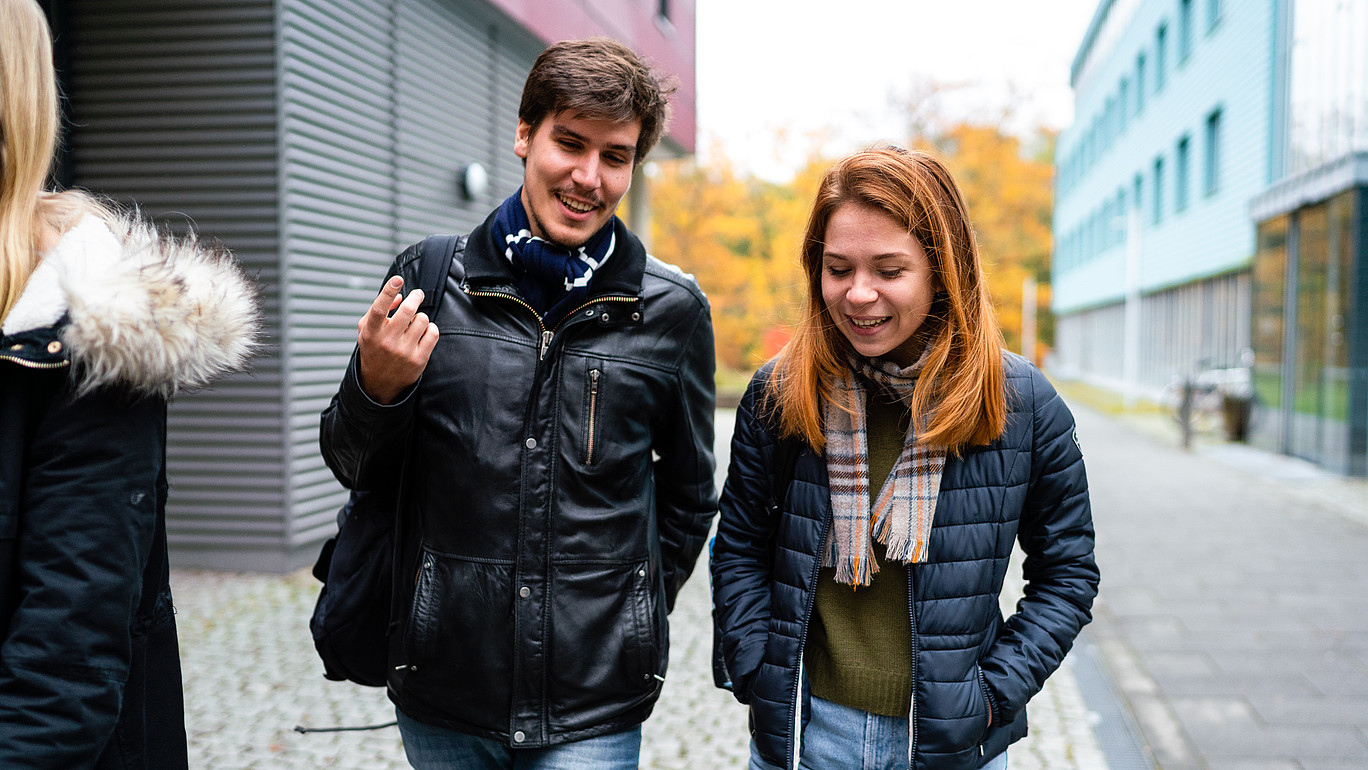Görlitz is the most international city in Saxony. Professors on living internationality at both university locations.

The term multiculturalism is used to describe a peaceful, mutually beneficial coexistence, cooperation and interaction between different cultures. Professor Matthias Theodor Vogt has always been committed to this philosophy. He was appointed to the Faculty of Management and Cultural Studies for the areas of cultural policy, cultural history and intercultural cooperation. Currently, he has been studying statistical data from the State Office of Saxony and the city of Görlitz in detail, as well as data from various employers. The result is that the city of Görlitz is more multicultural than expected in direct comparison with Saxon conurbations.
"Görlitz is the most international city in Saxony in terms of the number of residents with their main place of residence," emphasizes Professor Vogt.
”A thesis backed up with hard data, which does not surprise the cultural politician, as he feels the international flair of the HSZG in Görlitz on a daily basis in his teaching activities on the Culture and Management course.
Prof. Dr.-Ing. Frank Worlitz, Dean of the Faculty of Electrical Engineering and Computer Science, feels the same way. He is a guest lecturer and subject coordinator for mechatronics at the Chinese-German University of Applied Sciences (CDHAW). In this role, he regularly supervises Chinese students who are visiting the university in Zittau as part of Tongji University's exchange program. He also likes to see for himself the progress made by the German mechatronics students, who in turn gain valuable practical experience in Shanghai.
We have earned the excellent reputation of our international exchange programs over many years. Prof. Dr.-Ing. Frank Worlitz
”In this interview, the two professors talk about what internationality looks like in practice at both HSZG campuses.
Prof. Vogt, you teach in Görlitz, statistically the most international city in Saxony, as you have stated. What do you think makes a university international in practice?
When we don't just learn about something far away from watching TV, but when students can receive and discuss "Culture and Management" first-hand reports from France, Georgia, Cameroon and Mongolia through our doctoral students. Or when they study together with fellow students from Slovakia, Hungary or the Baltic States. Or when they can freely choose a country anywhere in the world for their semester abroad, both the location and the study modules. Or if they acquire an entire German-Hungarian dual degree in Pécs. Or when a colleague from the State University of Tbilisi physically comes to Görlitz with his wife and child and we teach a joint research seminar in English. Or when a speaker from far away gives a guest lecture at the Ost-West-Kolleg every two weeks. Or when we regularly travel to Wroclaw and Prague for smaller excursions and to Vienna and Budapest for larger excursions. Studying in a border town like Görlitz/Zgorzelec brings enormous advantages.
Culture and Management, Tourism Management and soon also International Business Communication - the HSZG offers a wide range of courses for those interested in international experiences. How important is intercultural cooperation for you in teaching?
A decisive one. Anyone who decides to study is aiming for a highly qualified and highly paid job. And it's not enough to be able to order a beer in bad English. You have to be able to get involved with people whose societies tick differently to the German one. And do a quick calculation: if 80 million out of almost 8 billion people live in Germany, that's only one percent. The others are no less than 99 percent of the people with whom we want to act in peace and act together. Studies must prepare us for this in terms of content, people and space. If I'm right, I was the first university lecturer in Saxony to be appointed to the subject area of intercultural cooperation. I am all the more pleased about the importance of the subject in so many professions today.
On an intercultural level, how do you perceive the cooperation between your foreign students and German fellow students?
As a great benefit. We are currently experiencing a climate of opinion that shies away from complexity and relies on simple answers; Thomas Bauer has called this the "simplification of the world". Working together with their foreign fellow students offers German students a chance to realize what we don't know because we are trapped in a national or class-specific cage of unambiguity and are therefore unable to take advantage of the opportunities offered by ambiguity. And isn't it the essence of science that we can recognize differences, distinctions and alterities and name them without false zeal?
As an expert in cultural history, you deal with different aspects of lived internationality. What is your current project?
At the moment, I am concerned about how the countries of the world, which have piled up unheard-of debts due to the coronavirus measures, can preserve the arts and their institutions. As a visiting professor at the Pontifical Gregorian University, I spent the 2020/21 academic year working with students from the Congo, Bolivia and many other countries to develop cultural policy strategies for their respective countries. This kind of dialog is a great thing: the young people are naturally much closer to their countries.
My current project, on the other hand, is a photo exhibition entitled "Cameroon through the eyes of a thousand women". We will open it on
September 2 at 7:30 pm in Kirschau here in Upper Lusatia and later show it in Wroclaw and Liberec. When Polish, Czech and German students discuss with African artists, all four groups come close together.
In which areas can the multicultural cooperation at the HSZG still be improved?
In the English-language modules. If each of our degree courses had a set of, say, ten modules, we could have a lot more guest students coming to us and adding to the flair. It's good that the new university management has recognized the opportunity and is working on it at a fast pace.

Prof. Worlitz, as subject coordinator for mechatronics at the Chinese-German University of Applied Sciences (CDHAW), you are used to contact with Chinese students who come to the HSZG in Zittau. How do these students perceive our university?
Our university has a very good reputation among Chinese students. This is also reflected in the fact that we accept the most students in the consortium and the HSZG often comes first and second on the wish list. In recent years, the best students of the year have always been in the Zittau group. The fact that two participants from the last summer school subsequently came to Zittau is also a sign of the good impression the HSZG makes. This cannot be taken for granted. From the Shanghai perspective, Germany is associated with Munich, Berlin and Hamburg and the parents, who bear the costs for the studies, look very closely at where their children are studying in Germany. We have built up this good reputation over many years.
What is behind the summer school program for Chinese students?
It has now become a tradition for CDHAW students to attend a summer school in Germany during the semester break. What was new in 2019 was that the two-week trip to the universities in Mannheim, Göttingen, Prague, Regensburg and Munich also included a stop at the HSZG in Zittau. The Summer School gives students the opportunity to find out more about Europe and Germany and get to know possible university locations for their stay abroad. The program of the Summer School in Zittau included selected experiments in the laboratories as well as a tour of the Zittau Süd signal box, which is also used for teaching in the faculty. Of course, a trip to the nearby Zittau Mountains on the narrow-gauge railroad was a must on such an occasion. Following the suspension of the summer school due to the pandemic, we hope to be able to resume the program next year.
For some time now, students studying mechatronics have had the opportunity to take part in the CDHAW program at Tongji University and travel to China for a period of study. Industrial engineering students can also take advantage of this offer. How did this come about?
At the CDHAW, we started with the Mechatronics, Vehicle Service Engineering and Building Services Engineering courses. In 2008, the industrial engineering course was added. This has developed well and enrols by far the most German students at the CDHAW. Of the total of 43 German students in 2020, 33 graduated with a double degree. This offer is also open to our students on the Business Informatics degree program.
Mexican students are also frequent guests in the lecture halls of the Faculty of Electrical Engineering and Computer Science as part of the Mexican-German university cooperation. How do you experience student interaction and cultural exchange between the Mexican and German cultures?
Two years ago, we welcomed Mexican students from Tec Monterrey to the HSZG for the first time on the Automation and Mechatronics course. The hospitality and openness of Mexicans in general is legendary. As a result, the students quickly make friends. The program is taught entirely in English. The Mexicans listen to the lectures separately and not together with German students. The exchange mainly takes place in the halls of residence or via the university's sports facilities. The Mexican evening, which is organized by the South American students, is also legendary. Despite the pandemic, the program has been able to continue. In the future, we will also be able to welcome Mexican students on the computer science course in Görlitz.

Lucie Koutková, Head of the University's International Office, emphasizes that Zittau/Görlitz University of Applied Sciences is an international educational institution: "Our contacts around the world are as diverse as the students' wishes and visions for the future."
The university has partnerships with over 100 universities in more than 40 countries. From South Africa to the USA, from Mexico and Holland to Russia and China. At the HSZG, the term "springboard into the wide world" takes on a tangible dimension.
Are you interested in studying abroad? The International Office of the HSZG will be happy to advise you!
Information about all partner universities and international cooperations can be obtained from the University's International Office.
The interviews were conducted by Cornelia Rothe M.A.